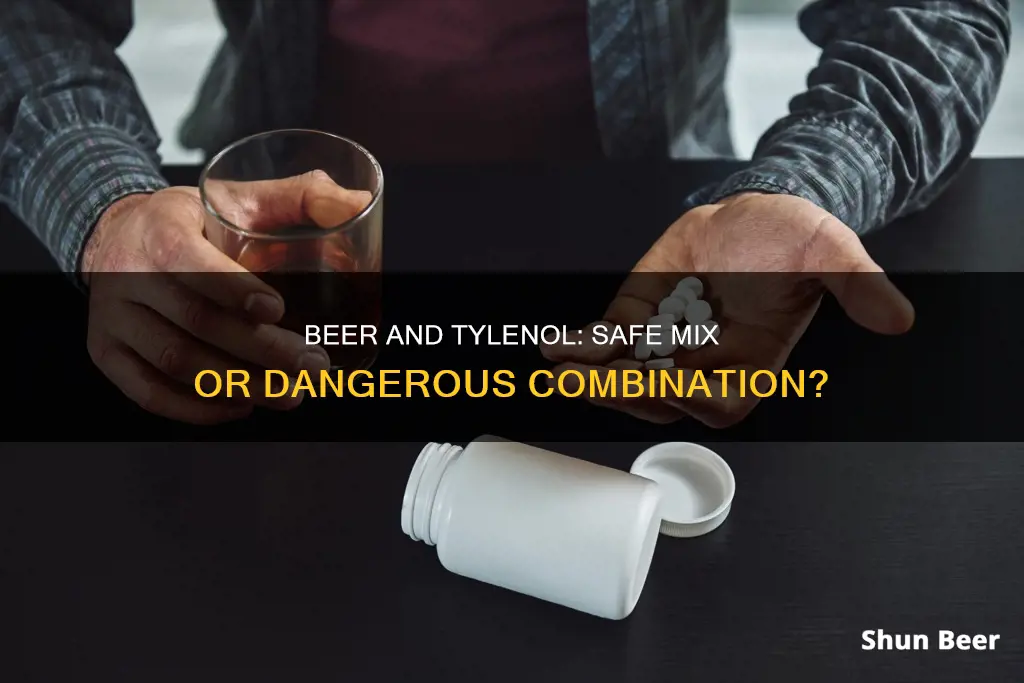
Tylenol, also known as acetaminophen, is a common medication used to treat minor aches, pains, and fevers. It is generally safe and can be purchased over the counter. However, combining Tylenol with alcohol can have adverse effects, especially on the liver, which is responsible for breaking down both substances. While light drinking with normal Tylenol use may not have a significant effect, heavier drinking or higher Tylenol doses can increase the risk of liver damage. This is because the liver breaks down both substances using the same process, and when combined, the liver may struggle to process them, leading to a buildup of harmful substances. Therefore, it is generally recommended to avoid mixing Tylenol and alcohol unless instructed by a doctor.
| Characteristics | Values |
|---|---|
| Is it safe to take Tylenol after drinking alcohol? | Generally, it is safe to take a normal dose of Tylenol after drinking a small amount of alcohol. However, mixing Tylenol and alcohol can potentially lead to liver damage, especially if one consumes too much alcohol or takes too much Tylenol. |
| How does alcohol and Tylenol affect the liver? | Both substances are processed in the liver, which has a finite capacity to process chemicals. When combined, they can stay in the bloodstream for longer, causing extra stress on the liver and increasing the risk of damage. |
| What are the signs of liver damage? | Yellowing of the skin or whites of the eyes, swelling in the abdomen, bruising or bleeding, increased sensitivity to alcohol or Tylenol, abdominal pain, nausea, vomiting, mental status changes, and liver lab abnormalities. |
| What should one do if they suspect liver damage? | Contact a doctor as soon as possible to be evaluated and treated if necessary. |
| Are there any alternatives to Tylenol? | Non-steroidal anti-inflammatory drugs (NSAIDs) such as ibuprofen and naproxen are usually safer to use with alcohol but may cause gastrointestinal discomfort or bleeding. |
What You'll Learn

The dangers of combining Tylenol and alcohol
Tylenol, also known as acetaminophen, is one of the most commonly used medications for treating minor aches, pains, and fevers. It is also a common ingredient in many other medications, including cold and flu remedies, and prescription painkillers.
While Tylenol is generally considered safe, there are some instances when caution should be exercised, such as when drinking alcohol.
The liver breaks down both Tylenol and alcohol. When Tylenol is metabolised, it turns into a substance that can cause liver damage. This is usually not an issue when the liver is working normally, as it will convert this harmful substance into a harmless one.
However, if the liver is working harder than usual, such as when you drink too much alcohol, it breaks down Tylenol too quickly, leading to a build-up of the harmful substance, which can cause liver damage.
Combining Tylenol and alcohol can lead to liver damage, and in rare cases, this can be severe or even life-threatening. This is because the liver has a finite capacity to process chemicals, so when both substances are present, it takes longer to process each of them, and they remain in the bloodstream for longer. This places extra stress on the liver, increasing the potential for damage.
Who is most at risk?
People with certain risk factors are more likely to experience liver damage when combining Tylenol and alcohol. These include:
- People who drink more alcohol than is recommended (more than one drink per day for women and no more than two drinks per day for men)
- People who take more Tylenol than is recommended (more than 3,000 mg per day for adults)
- People with chronic liver disease
- People with other health conditions or who take medications that affect liver health
It can be hard to tell when you first start having liver problems as the symptoms are vague and similar to those experienced when drinking alcohol. These include:
- Feeling generally unwell
- Nausea and vomiting
- Constipation or diarrhoea
- Indigestion
- Cough or shortness of breath
More severe symptoms of liver damage include:
- Yellowing of the skin and eyes (jaundice)
- Abdominal pain or swelling
- Abnormal bleeding or bruising
- Rapid heartbeat
- Confusion, fatigue or loss of consciousness
- Excessive sweating
To reduce your risk of liver damage from Tylenol and alcohol, it is important to minimise your use of both. Guidelines include:
- Using less than 3,000 mg of Tylenol per day
- Not taking Tylenol for longer than 10 days in a row for pain, or three days in a row for fever, unless recommended by a doctor
- Drinking fewer than three alcoholic drinks per day
- Checking all medications to see if they contain Tylenol
- Taking only one product that contains Tylenol at a time
When to seek medical help
If you experience any symptoms of liver damage, it is important to act fast and seek immediate medical attention, even if you don't feel particularly unwell. Call 911, go to the emergency room, or call a poison control centre.
Beer and Sudafed: What You Should Know
You may want to see also

How Tylenol and alcohol affect the liver
The liver is the body's largest internal organ and has several important functions, including aiding digestion, regulating blood sugar and cholesterol levels, and filtering toxins from the blood. While the liver has a tremendous ability to recover, liver damage can impair its ability to carry out these vital functions.
Alcohol is directly toxic to the liver, and so are the byproducts of alcohol metabolism. When the liver breaks down alcohol, it creates a chemical called acetaldehyde, which can damage DNA and does not allow the body to repair the damage. This is why at least six cancers are linked to alcohol consumption.
Chronic alcohol consumption can also worsen liver damage from acetaminophen (the active ingredient in Tylenol) overdose. When alcohol and acetaminophen are consumed together, the risk of severe liver damage increases as the amounts of each substance in the body increase. This is because the liver breaks down both substances, and excessive consumption of either can have dangerous side effects.
Acetaminophen is metabolized in two ways. Firstly, the body processes around 90% of the drug through a process called glucuronidation, which does not produce any dangerous byproducts. Secondly, the CYP2E1 liver enzyme breaks down around 5-10% of the drug, producing a toxin called NAPQI. The liver produces an antioxidant called glutathione to remove the toxin before it can build up and cause liver damage.
When alcohol is consumed, it increases the activity of CYP2E1, so the body produces more NAPQI. Alcohol also decreases glutathione production, meaning NAPQI is more likely to build up in the liver in dangerous concentrations. This can cause acute liver damage, failure, and even death in severe cases.
To reduce the risk of liver damage, it is important to follow the recommended dosages for acetaminophen and not to exceed more than three alcoholic drinks per day.
Tanning with Beer: Does It Work?
You may want to see also

Side effects of mixing Tylenol and alcohol
Tylenol, also known as acetaminophen, is one of the most commonly used medications for treating minor aches, pains, and fever. It is generally considered safe, but there are certain instances when caution must be exercised, such as when drinking alcohol.
Liver Damage
Mixing Tylenol and alcohol can potentially lead to liver damage. This occurs because both substances are broken down in the liver, increasing the production of a harmful substance that attacks the liver. The risk of liver damage increases as the amount of each substance in the body increases. Additionally, chronic alcohol consumption can worsen liver damage caused by Tylenol overdose.
Stomach Irritation and Ulcers
The combination of Tylenol and alcohol can irritate the stomach and, in severe cases, cause ulcers and internal bleeding.
Increased Risk of Certain Medical Conditions
Drinking alcohol while taking Tylenol can increase the risk of certain medical conditions, such as abnormal bleeding and swelling, and increased pressure in the brain.
Adverse Drug Interactions
Tylenol and alcohol can interact with each other, altering their metabolism and pharmacological effects. This can result in increased side effects or reduced effectiveness of the medication.
Heightened Risk for Certain Individuals
People with certain risk factors are more susceptible to liver damage from mixing Tylenol and alcohol. These include individuals with liver damage or liver failure, those who binge drink or frequently consume large amounts of alcohol, and those taking more Tylenol than recommended.
To reduce the risk of side effects, it is important to use Tylenol and alcohol in moderation and follow the recommended doses and durations of use. It is also crucial to be honest with your doctor about your alcohol consumption to ensure safe medication use.
Beer and Axes: Is It Safe to Mix?
You may want to see also

How long after drinking alcohol is it safe to take Tylenol?
Tylenol, also known as acetaminophen, is one of the most commonly used medications for treating minor aches, pains, and fevers. It is available over the counter and is generally considered safe. However, when it comes to mixing Tylenol with alcohol, there are some important considerations to keep in mind.
Both Tylenol and alcohol are processed by the liver. While each substance individually puts some strain on the liver, the combination can make it harder for the liver to break them down, causing higher levels of each substance to remain in the liver. This can potentially lead to liver damage, including liver failure, and even death in severe cases. Therefore, it is generally recommended to avoid mixing Tylenol and alcohol whenever possible.
If you are drinking within the recommended limits (no more than one drink per day for women and no more than two drinks per day for men), it is generally safe to take Tylenol whenever you normally would. However, if you drink heavily or binge drink, it is best to avoid taking Tylenol until the effects of the alcohol have worn off. This can take 12 to 24 hours or more, depending on how much alcohol was consumed.
It is important to follow the dosing instructions on the package or as directed by your healthcare provider. Taking more than the recommended dose of Tylenol can increase the risk of liver damage, especially when combined with alcohol. Additionally, certain people may be at higher risk of liver damage when mixing Tylenol and alcohol, including those with underlying liver disease or chronic health conditions.
If you are unsure about whether it is safe for you to take Tylenol after drinking alcohol, it is always best to consult with your doctor or healthcare provider. They can advise you based on your individual health status and drinking habits.
The Beer Hall Putsch: What If It Succeeded?
You may want to see also

Alternatives to Tylenol
While Tylenol (acetaminophen) is a widely used medication for treating mild aches, pains, and fever, it is not without its risks. The potential for liver damage exists even at recommended dosages, and this risk increases with higher dosages. Therefore, it is important to consider alternative medications, especially if you are a frequent drinker of alcohol. Here are some alternatives to Tylenol:
Nonsteroidal Anti-Inflammatory Drugs (NSAIDs)
NSAIDs such as ibuprofen (Advil, Motrin) and naproxen (Aleve, Anaprox) are popular alternatives. They may be more effective than acetaminophen for certain conditions as they reduce inflammation in addition to relieving pain. However, NSAIDs can irritate the stomach and cause side effects such as an upset stomach, especially when combined with alcohol. They also carry an increased risk of heart attack, stroke, and kidney failure when taken at high doses or for extended periods.
Tramadol
Tramadol is a strong opioid pain-relieving medication used to treat moderate to severe general and nerve-related pain. However, it may be habit-forming, and misuse can lead to addiction. Alcohol can increase the nervous system side effects of tramadol, including dizziness and drowsiness.
Gabapentin
Gabapentin is an anticonvulsant with pain-relieving effects used to treat certain seizure disorders or relieve nerve pain. Common side effects include dizziness and drowsiness. As with tramadol, alcohol can increase these nervous system side effects.
Non-opioid Prescription Drugs
Non-opioid prescription drugs can be used in combination with NSAIDs or acetaminophen. For example, tricyclic antidepressants are effective at treating nerve pain and have the added benefit of treating depression, a major risk factor for addiction. Gabapentinoids, originally used as antiseizure drugs, are another option, as they can calm over-firing nerves.
Localized Numbing
For certain procedures or surgeries, localized numbing of problem areas can be effective in managing pain. This involves injecting an anesthetic into the affected area to numb it temporarily.
Non-drug Treatments
Non-drug treatments such as ice, massage, exercise, physical therapy, acupuncture, and relaxation training can be beneficial in managing chronic pain. These methods do not carry the same risks as medications and can be safer alternatives, especially for those with liver disease or increased risk factors for liver damage.
Beer and Vitamins: Can They Mix?
You may want to see also







